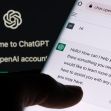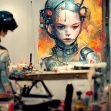Legal challenges surrounding generative artificial intelligence (AI) is increasing as actors prepare to join artists, authors, and publications in claiming AI firms' use of copyrighted works and personal data. This week, actress Scarlett Johansson threatened to sue OpenAI, accusing the company of imitating her voice without permission.
On Monday, Johansson alleged that OpenAI had copied and imitated her voice for its AI system after she declined an offer to license it. According to Johansson, OpenAI requested her voice for a feature named "Sky." Despite her refusal, OpenAI proceeded with a demo that Johansson claims mimicked her voice so closely that even her friends and news outlets could not discern the difference.
“When I heard the released demo, I was shocked, angered, and in disbelief that Mr. Altman would pursue a voice that sounded so eerily similar to mine,” Johansson wrote in a statement. She further noted that OpenAI CEO Sam Altman had tweeted “Her,” referencing her role as an AI assistant in the film *Her*.
Johansson has hired legal counsel, which has sent two letters to OpenAI demanding details on the creation of the "Sky" voice. The letters outlined potential legal claims and were sent after OpenAI launched its demo. Following the legal threats, OpenAI dropped "Sky," but the potential for litigation remains.
The legal threat comes amidst a broader wave of lawsuits against AI firms. Recently, a class action was filed in New York federal court against AI startup LOVO, accusing it of using the voices of actors, including Johansson, Ariana Grande, and Conan O'Brien, without consent to train its AI systems.
The Screen Actors Guild‐American Federation of Television and Radio Artists (SAG-AFTRA) has been lobbying for federal legislation to protect actors’ likenesses and voices from being replicated by AI without permission. The union has supported the introduction of three bills in Congress that would create federal voice and likeness rights and criminalize nonconsensual deepfaked sexual imagery.
SAG-AFTRA highlighted the limitations of the current patchwork of state laws, stressing the need for robust federal protection. "The incident highlights the importance of protecting your voice in an age of AI. It is no longer science fiction to easily clone a voice; it is science fact,” said a SAG-AFTRA spokesperson.
Paul Skye Lehrman, a voiceover artist suing an AI startup, expressed concern over the broader implications of AI on the entertainment industry. Lehrman reported a significant reduction in job opportunities and damage to his professional reputation due to the unauthorized use of his voice by AI systems.
The legal challenges against AI firms reflect underlying mistrust and concern among creators about the impact of AI on their work and livelihoods. A study of 300 Hollywood leaders indicated that AI tools are expected to significantly reduce job opportunities in the industry, with an estimated 204,000 positions adversely affected over the next three years.
OpenAI's CTO, Mira Murati, defended the company, stating that the voice assistant was not intended to mimic Johansson. However, the firm’s refusal to disclose the data used to train its AI systems and its history of legal disputes have fueled skepticism.






